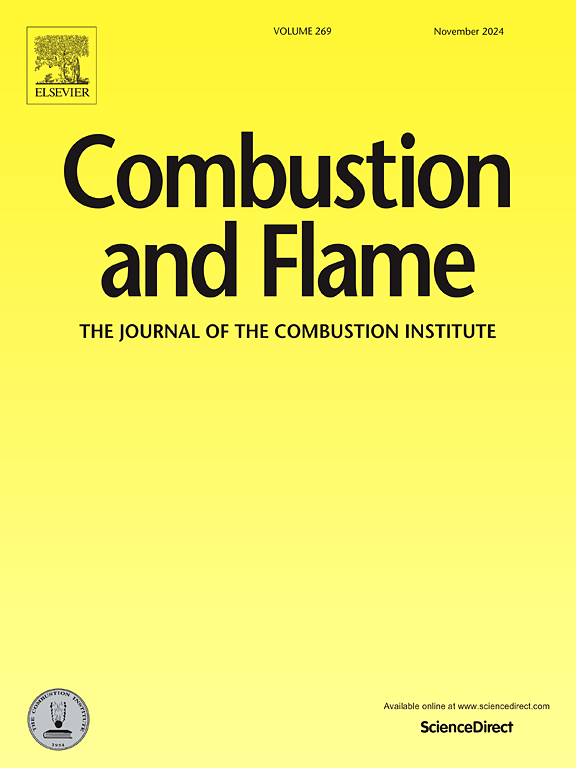Analytical study of a flame propagation front in a solid phase driven by chain-branching reactions at large Zel’dovich numbers: Steady states, stability and influence of the radicals Lewis number
IF 5.8
2区 工程技术
Q2 ENERGY & FUELS
引用次数: 0
Abstract
The combustion wave propagation in the condensed phase is investigated analytically in the large Zel’dovich number limit. The study is based on a two-step chain branching model for combustion reactions in which the flammability limit is explicitly present. As is common in gasless combustion, the diffusion of the initial fuel is assumed to be negligible. However, the effect of intermediate product diffusion on wave propagation velocity is analyzed, along with the stability of the corresponding dynamic response. With heat release as the controlling parameter, a Hopf bifurcation is encountered as the parameter decreases, leading to the emergence of an oscillatory instability. It is found that this instability ultimately leads to the extinction of the combustion wave, even under adiabatic conditions. Additionally, the effect of heat loss on flame stability and dynamics is examined.
Novelty and significance statement For the first time, the analysis of combustion wave propagation in the solid phase using a two-stage chain branching combustion model is performed in analytical form. In the absence of fuel diffusion, which is natural for combustion in the condensed phase, the effect of the final diffusion of intermediate radicals is investigated. The effect of volumetric losses is also studied. The results are obtained for stationary solutions of propagation and their stability is investigated. It is shown that even in the absence of heat loss, there is a region of parameters in which the combustion wave is unstable, which leads to its extinction.
大Zel 'dovich数下链支反应驱动的固相火焰传播前沿的分析研究:稳态、稳定性及自由基Lewis数的影响
在大泽尔多维奇数极限下,分析研究了燃烧波在凝聚相中的传播。该研究基于燃烧反应的两步链分支模型,其中可燃性极限明确存在。在无气体燃烧中,假定初始燃料的扩散可以忽略不计。分析了中间产物扩散对波传播速度的影响,以及相应动力响应的稳定性。以放热为控制参数时,随着参数的减小,会出现Hopf分岔,导致振荡不稳定性的出现。研究发现,即使在绝热条件下,这种不稳定性最终也会导致燃烧波的消失。此外,还研究了热损失对火焰稳定性和动力学的影响。本文首次以解析形式对两级链支燃烧模型在固相中的燃烧波传播进行了分析。在没有燃料扩散的情况下,研究了中间自由基的最终扩散对凝聚相燃烧的影响。研究了体积损失的影响。得到了传播平稳解的结果,并对其稳定性进行了研究。结果表明,即使在没有热损失的情况下,也存在一个燃烧波不稳定的参数区域,从而导致燃烧波的消失。
本文章由计算机程序翻译,如有差异,请以英文原文为准。
求助全文
约1分钟内获得全文
求助全文
来源期刊

Combustion and Flame
工程技术-工程:化工
CiteScore
9.50
自引率
20.50%
发文量
631
审稿时长
3.8 months
期刊介绍:
The mission of the journal is to publish high quality work from experimental, theoretical, and computational investigations on the fundamentals of combustion phenomena and closely allied matters. While submissions in all pertinent areas are welcomed, past and recent focus of the journal has been on:
Development and validation of reaction kinetics, reduction of reaction mechanisms and modeling of combustion systems, including:
Conventional, alternative and surrogate fuels;
Pollutants;
Particulate and aerosol formation and abatement;
Heterogeneous processes.
Experimental, theoretical, and computational studies of laminar and turbulent combustion phenomena, including:
Premixed and non-premixed flames;
Ignition and extinction phenomena;
Flame propagation;
Flame structure;
Instabilities and swirl;
Flame spread;
Multi-phase reactants.
Advances in diagnostic and computational methods in combustion, including:
Measurement and simulation of scalar and vector properties;
Novel techniques;
State-of-the art applications.
Fundamental investigations of combustion technologies and systems, including:
Internal combustion engines;
Gas turbines;
Small- and large-scale stationary combustion and power generation;
Catalytic combustion;
Combustion synthesis;
Combustion under extreme conditions;
New concepts.
 求助内容:
求助内容: 应助结果提醒方式:
应助结果提醒方式:


